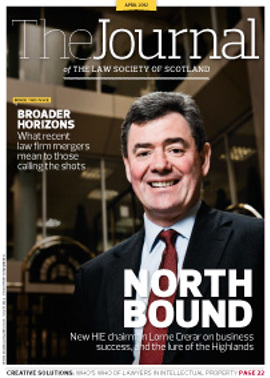Heart in the Highlands

Glasgow law firm chairman appointed to lead Highlands & Islands Enterprise. You might wonder at the connection, the qualifications, but when you hear Harper Macleod’s Lorne Crerar talk about his new role, you quickly realise that this is someone whose heart and soul will go into the job.
Though born and brought up in Glasgow, the Highlands is definitely Crerar’s spiritual home: nearly every weekend is spent in the Gairloch house bought by his late parents. “My sense of wellbeing is there; I think of it as home and spend as much time there as I can,” he says. There and in Harper Macleod’s still-growing Inverness office, the first Highland branch of a Central Belt law firm when opened in 2004.
Crerar’s name has been constantly linked with the public sector, ever since his first post, with Scottish Enterprise Glasgow, 16 years ago. That was followed by convenership of the then newly created Standards Commission, overseeing ethical standards in public life, which in turn led on to the Crerar Review of “Regulation, Audit, Inspection, Complaints Handling in the Public Sector”. That and six years as a non-executive director at the Scottish Government Justice Department preceded a seat on the HIE board, leading to the chairmanship (a three year term) when the vacancy arose.
What for him is the attraction of public service? “I encourage all the partners here to be as much involved in the business of their sectors as they can,” he replies. “I think 17 of them teach in different disciplines, and quite a few are non-executive directors. The public sector I found very interesting, and it gives you an insight into Scotland and what we’re doing and why.”
In terms of involvement in his sectors, Crerar practises what he preaches. With client work comprising an unusual mix of banking and sports law as well as the public sector, he keeps an inside view of banking through teaching an honours and masters class at Glasgow University (“I’ve been teaching since I graduated and always enjoyed it”), and writing (his Law of Banking textbook and Stair Encyclopedia chapters); and of sport governance through chairing the Six Nations, the European Rugby Cup and the SRU discipline panels. “So it all fits together, and knowing your market and your sector is pretty important in how you deliver legal services.”
Community culture
Returning to HIE, the body effectively sits alongside Scottish Enterprise, performing for the greater part of Scotland’s land area the role that its sister enterprise agency carries out in the south and east. Except there is more to it in the Highlands. HIE’s website comes over strongly on community development. As Crerar explains, “that’s about trying to recognise that we have very remote communities who need help generating sustainable economic growth and dealing with the challenges of remote and fragile communities. For example, it is hoped the whole region will have superfast broadband commencing early in 2013. Technology can provide enormous opportunities, allowing a skilled and motivated workforce to retain their much cherished culture in a beautiful place.”
Formerly the Highlands & Islands Development Board, HIE is very much part of life there. “Most everywhere you go in the Highlands, people remember HIDB and HIE, so it’s very enmeshed in the culture of the Highland business community”, Crerar observes.
It adds to the demands of the chairmanship, which he took up three weeks before we met. “The board’s purpose is to create the strategy of the organisation and see that it’s delivered over the next three years through the operating plan on the website. The role of chairman is quite different: you are a spokesperson for the organisation, you are the leader of the board, but it’s very different in terms of the intensity and the involvement that you have.”
But, he adds: “Being chairman of HIE is to be honest a bit of a dream job for me. The Highlands is home and being around the Highlands doing things is for me a real pleasure. It’s involved in business, it’s in the Highlands and I get to see more of the Highlands.”
One link between his HIE role and his legal practice is renewable energy, which is seen in the Highlands as one of the biggest potential drivers of growth. He comments: “The extent of our natural resources and the potential to exploit them are hugely exciting, and should be for law firms in terms of being part of a burgeoning community.”
Spotting the opportunity to do something different, Harper Macleod initiated the Scottish Highlands Renewable Energy Conference (SHREC), the third annual staging of which takes place on 26 April. Targeted towards potential clients and their intermediaries in the industry, it has succeeded in securing Fergus Ewing, Minister for Energy, Enterprise and Tourism, as this year’s keynote speaker.
Strategic view
Strategy looms large when Crerar speaks about business success more generally. It was having a strategic focus that set his firm on its course when he and (now senior) partner Rod McKenzie started out together in 1988. “We knew where we wanted to be and we’ve really tried hard to deliver it. And in Harper Macleod we are continually reviewing our strategy because we’re always trying to meet market need.”
The market was less sophisticated then, he says, and it was easier “to persuade people to come and give you a try”, but the biggest boost was from the coming of public procurement, which gave the firm the chance to pitch on a level playing field.
When the recession began to bite, further strategic decisions were taken that have paid off, as 20% of its lawyers were retrained out of banking, corporate, and private client, into more litigious areas. “We were fortunate that we had won a series of contracts that enabled us to do that; last year, our turnover was up 10% to just over £17 million, so a lot of the planning that we put in place has now come good. And we’ve increased our headcount since April 2008 by just over 20%, so we have grown in difficult times.”
When I ask if the firm sees itself remaining wholly Scottish based, he replies “Yes”, with no hesitation. “A key part of our strategy has been our Scottish-only focus, and we still think there is a lot to do here. We’ve just been extending our Inverness offering, and we see Scotland as a place where we can significantly grow as things change in the political landscape.”
I wonder, given Harper Macleod’s links with numerous smaller firms – currently about 170 – through its Connect2Law network that offers specialist advice, what Crerar’s advice to a high street practice in the current economic climate would be. It’s strategy based, of course. “Everyone has strengths, including the smallest of firms. It’s identifying what is the strength you have and that you can use to beat the competition. For every firm a strategy is really important: think about what you have by way of strengths and how to maximise the opportunities that they can give you.”
He also believes that although there are more indicators of economic optimism generally than a few months ago, with the easing of the euro crisis, there remain tough times ahead for the legal profession. “I don’t see what’s happened to the profession in Scotland as being a recession; it’s been a revolution in the sense that it’s made a lot of law firms look very carefully at their business model and how it works. I think we’re still evidencing a great deal of structural change certainly in the biggest law firms in Scotland, and that will continue.”
Crerar points to the current spate of mergers – not that his firm needs that route to achieve growth. “We are an organically growing firm. I think we have the highest retention rate of any law firm in Scotland. We expect our trainees to become our assistants, our assistants to become our associates, our associates to become our partners. And many of our partners started out as our trainees. Which is great.”
As for ABS, it represents both a threat and a “significant opportunity”, in what some call commoditised work, but Crerar refers to as “strategic innovation about how you do work for clients”. While some believe it will have most impact in the high street, he comments: “For Harper Macleod we have to be constantly aware that there may be new emerging competition in our markets and I’m sure that there will. But if you’ve got a good enough offering and the markets are opening up, there’s no reason why we can’t be there too.”
Making peace?
There is of course one other public sector job with which Lorne Crerar will long be associated in solicitors’ minds, and he laughs when I ask whether the profession has forgiven him yet. “No, I don’t think so! I suppose the most challenging thing I’ve ever done outside of my transactional legal work was the home report. I became convinced that the home report system would get rid of a great deal of waste and significantly improve the consumer experience in buying and selling property. But trying to persuade the Law Society, the Council of Mortgage Lenders and the RICS was an experience I will go to my grave with. The politicians saw the value in it, but I’ve had bread rolls despatched through the air in my direction at law dinners; I’ve been abused all across Scotland by professional colleagues; so no, I’ve not been forgiven, but it’s still here.”
You suspect that he can take any amount of abuse as long as he retains the inner peace of his Highland connection. On his HIE role he concludes: “I’m determined to enjoy it while it lasts. The public sector, the roles I’ve done, it’s a real privilege to get them, and to make a bit of a difference. That’s very fulfilling.”
In this issue
- Data protection principles and family practice
- Data protection: another generation
- No guarantee of easy recovery
- Forced marriage: alive to the issue
- Mediation: business as usual?
- Electronic payments and electronic money
- Reading for pleasure
- Opinion column: Gillian Mawdsley
- Council profile
- Book reviews
- President's column
- Caution the souvenir hunters
- Together we thrive
- But you said...
- Heart in the Highlands
- Cut the lockup cost
- Who's who in intellectual property
- Taking liberties with bail
- Personal licences: a need for review?
- TUPE: fair or unfair for staff?
- 10%: a real gain?
- Renovating home PDRs
- Ademption and powers of attorney
- Working group to take forward ILG review
- Law reform roundup
- From the Brussels office
- Feedback, take 2
- Chinks in your defences?
- Business checklist
- Ask Ash






